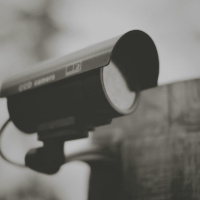Can You Sue a Security Company?

This article was last updated on Aug. 17th, 2022
Short answer: Yes. In lawsuits where a security a guard has been negligent, it is often the land or property owner employing the security company, and the security company employing the guard, who are both named as defendants. Typically, such lawsuits are under the legal theory of premises liability.
Security cameras and security guards are intended to protect people from harm. When security companies or their employees act negligently, innocent people can become injured. If you have been injured by a negligent security company or security guard, you may be wondering about your legal options. How will you recover compensation for your medical bills? How will you pay your other bills when you have had to take time off of work to recover from your injuries? In some instances, you may be able to bring a lawsuit against the negligent security company.
Suing a Negligent Security Guard Directly
Security guards are private citizens, not law enforcement officers. Some security guards may be employees of a police department. Still, when they work as security guards for a private company, they are not working in their capacity as a city employee. As a result, security guards cannot physically restrain someone who is engaged in a crime. Security guards can only make physical contact with private citizens. Beyond minimally necessary actions to stop a dangerous crime, or a situation in progress. The only exception to this general rule involves self-defense.
To prove that a security guard’s negligence causes your injuries, you would need to show that the security guard breached his or her duty of care by not acting reasonably under the circumstances. Since a security guard has limited options to stop a crime in progress, it can be challenging to prove that he or she acted negligently by not immediately stopping the crime.
Suing the Security Company for Vicarious Liability
For reasons discussed above, obtaining compensation against the security company itself is not always the best option. In most cases involving negligent security, the victim has a better chance of bringing a premises liability lawsuit against the person or company who hired the security guard.
Suppose you have become injured due to negligent security on your property when you hired a security company to protect you. In that case, you may have a breach-of-contract claim in addition to a negligent security claim. If you have become injured by a security company’s failure to provide adequate property on someone else’s property who hired the company, you may be able to sue the property owner.
Negligent Hiring of Security Professionals
Security companies should perform criminal checks and background checks on their employees. Engaging another background checks will prevent security companies from hiring violent felons or people with other red flags in their background. Additionally, security companies should inquire about potential employees from their past employers to establish whether they pose a security risk.
Suppose a security guard was fired from his post in a parking lot. The guard left his assigned post in the parking lot to walk down to the local bar and drink. While the guard was in the bar, a customer walking to her car was assaulted and suffered injuries. A routine background check on the former security guard would reveal that he was fired. Should another security company hire the guard and another incident occur, the victim would have the right to sue the security company for negligent hiring.
Negligent Training of Security Employees
Security companies also have a legal responsibility to train their employees. Giving a person a badge and uniform without training them constitutes negligent training. The security company should teach their employees about threat detection and how to manage dangerous situations. They should also ensure that their employees know that they must stay in their posted location during their shifts.
Negligent Supervision of Security Employees
Negligent supervision involves managers not correctly supervising their employees. Every security company should have adequate protocols to ensure that their security guards do their jobs correctly and effectively. For example, suppose a security company does not keep track of each security guard’s performance. An employee may have had several incidents that he missed on his shift, and the company would not have a record of it.
Similarly, security companies should ensure that their employees make the rounds on their shifts instead of staying in one place. When companies do not verify that their guards have implemented these measures, and a victim becomes injured, they can be held liable for negligent security.
Negligent Retention of Employees
Negligent retention of employees involved a company’s failure to remove a dangerous security guard. Suppose a security guard has threatened customers or showing up to work intoxicated by alcohol. The security company has a legal obligation to terminate that guard’s employment before the guard’s negligent or intentional actions harm someone else.
Assault by a Security Guard
If a security guard was the perpetrator who caused your injuries by assault, you have a right to sue the security guard. Assault is a crime in Georgia, and it is also a tort. Prosecutors can bring criminal charges against the security guard. Additionally, the victim of the assault can bring a lawsuit in civil court to recover compensation for injuries caused by the assault. Depending on the facts of the case, victims of assault by a security guard may be able to sue the security company, as well.
